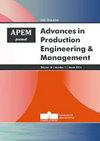求助PDF
{"title":"双寡头零售商与古诺或共谋博弈的制造商顾客满意度激励方案","authors":"H. Hu, Z. Zhang, Q. Wu, S. Han","doi":"10.14743/apem2020.3.370","DOIUrl":null,"url":null,"abstract":"To increase customer satisfaction (CS) which is closely linked to corporate reputation, revenue and customer loyalty, manufacturers will provide incen‐ tives to retailers in supply chain management. This paper focuses on two types of incentives that a manufacturer may provide to retailers: customer satisfaction index bonus (CSI bonus) and customer satisfaction assistance, and studies the optimal customer satisfaction incentive plan of the manufac‐ turer when duopoly retailers adopt Cournot or collusion game. By comparing the equilibrium of the two games, we conducted a preference analysis of both the manufacturer and the retailers. The results showed that no matter what kind of games the duopoly retailers take, the manufacturer will provide cus‐ tomer satisfaction assistance to the retailers to increase the customer satis‐ faction. However, if the duopoly retailers take Cournot behaviour, only when the wholesale price is greater than the threshold, the manufacturer will pro‐ vide the retailers with customer satisfaction index bonus. The manufacturer always prefers to Cournot behaviour, and the retailers always prefer to collu‐ sion behaviour. In addition, this paper also investigated the effect of custom‐ er satisfaction incentives on the manufacturer, and found that it will help the manufacturer obtain more demand and higher profits. © 2020 CPE, University of Maribor. All rights reserved.","PeriodicalId":48763,"journal":{"name":"Advances in Production Engineering & Management","volume":"14 1","pages":"345-357"},"PeriodicalIF":2.8000,"publicationDate":"2020-09-27","publicationTypes":"Journal Article","fieldsOfStudy":null,"isOpenAccess":false,"openAccessPdf":"","citationCount":"5","resultStr":"{\"title\":\"Manufacturer’s customer satisfaction incentive plan for duopoly retailers with Cournot or collusion games\",\"authors\":\"H. Hu, Z. Zhang, Q. Wu, S. Han\",\"doi\":\"10.14743/apem2020.3.370\",\"DOIUrl\":null,\"url\":null,\"abstract\":\"To increase customer satisfaction (CS) which is closely linked to corporate reputation, revenue and customer loyalty, manufacturers will provide incen‐ tives to retailers in supply chain management. This paper focuses on two types of incentives that a manufacturer may provide to retailers: customer satisfaction index bonus (CSI bonus) and customer satisfaction assistance, and studies the optimal customer satisfaction incentive plan of the manufac‐ turer when duopoly retailers adopt Cournot or collusion game. By comparing the equilibrium of the two games, we conducted a preference analysis of both the manufacturer and the retailers. The results showed that no matter what kind of games the duopoly retailers take, the manufacturer will provide cus‐ tomer satisfaction assistance to the retailers to increase the customer satis‐ faction. However, if the duopoly retailers take Cournot behaviour, only when the wholesale price is greater than the threshold, the manufacturer will pro‐ vide the retailers with customer satisfaction index bonus. The manufacturer always prefers to Cournot behaviour, and the retailers always prefer to collu‐ sion behaviour. In addition, this paper also investigated the effect of custom‐ er satisfaction incentives on the manufacturer, and found that it will help the manufacturer obtain more demand and higher profits. © 2020 CPE, University of Maribor. All rights reserved.\",\"PeriodicalId\":48763,\"journal\":{\"name\":\"Advances in Production Engineering & Management\",\"volume\":\"14 1\",\"pages\":\"345-357\"},\"PeriodicalIF\":2.8000,\"publicationDate\":\"2020-09-27\",\"publicationTypes\":\"Journal Article\",\"fieldsOfStudy\":null,\"isOpenAccess\":false,\"openAccessPdf\":\"\",\"citationCount\":\"5\",\"resultStr\":null,\"platform\":\"Semanticscholar\",\"paperid\":null,\"PeriodicalName\":\"Advances in Production Engineering & Management\",\"FirstCategoryId\":\"5\",\"ListUrlMain\":\"https://doi.org/10.14743/apem2020.3.370\",\"RegionNum\":3,\"RegionCategory\":\"工程技术\",\"ArticlePicture\":[],\"TitleCN\":null,\"AbstractTextCN\":null,\"PMCID\":null,\"EPubDate\":\"\",\"PubModel\":\"\",\"JCR\":\"Q2\",\"JCRName\":\"ENGINEERING, MANUFACTURING\",\"Score\":null,\"Total\":0}","platform":"Semanticscholar","paperid":null,"PeriodicalName":"Advances in Production Engineering & Management","FirstCategoryId":"5","ListUrlMain":"https://doi.org/10.14743/apem2020.3.370","RegionNum":3,"RegionCategory":"工程技术","ArticlePicture":[],"TitleCN":null,"AbstractTextCN":null,"PMCID":null,"EPubDate":"","PubModel":"","JCR":"Q2","JCRName":"ENGINEERING, MANUFACTURING","Score":null,"Total":0}
引用次数: 5
引用
批量引用
Manufacturer’s customer satisfaction incentive plan for duopoly retailers with Cournot or collusion games
To increase customer satisfaction (CS) which is closely linked to corporate reputation, revenue and customer loyalty, manufacturers will provide incen‐ tives to retailers in supply chain management. This paper focuses on two types of incentives that a manufacturer may provide to retailers: customer satisfaction index bonus (CSI bonus) and customer satisfaction assistance, and studies the optimal customer satisfaction incentive plan of the manufac‐ turer when duopoly retailers adopt Cournot or collusion game. By comparing the equilibrium of the two games, we conducted a preference analysis of both the manufacturer and the retailers. The results showed that no matter what kind of games the duopoly retailers take, the manufacturer will provide cus‐ tomer satisfaction assistance to the retailers to increase the customer satis‐ faction. However, if the duopoly retailers take Cournot behaviour, only when the wholesale price is greater than the threshold, the manufacturer will pro‐ vide the retailers with customer satisfaction index bonus. The manufacturer always prefers to Cournot behaviour, and the retailers always prefer to collu‐ sion behaviour. In addition, this paper also investigated the effect of custom‐ er satisfaction incentives on the manufacturer, and found that it will help the manufacturer obtain more demand and higher profits. © 2020 CPE, University of Maribor. All rights reserved.


